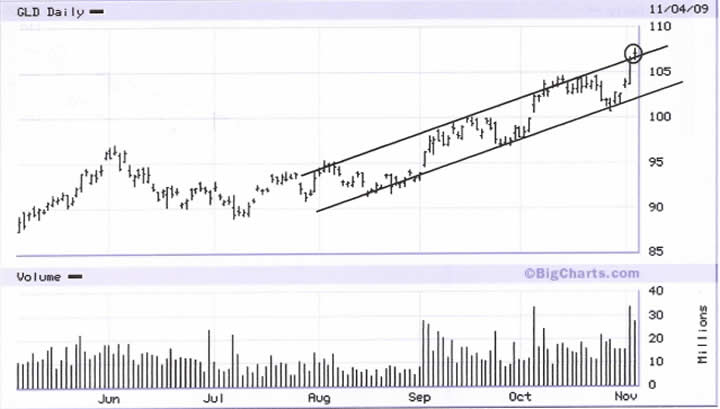Gold at Both Ends of the Economic K Wave Cycle
Commodities / Gold & Silver 2009 Nov 06, 2009 - 10:04 AM GMTBy: Clif_Droke
 Now that the 10-year cycle has peaked, fear will become the dominant emotion in the financial marketplace in the years ahead. Risk aversion is on the rise since the credit crisis and investors must look to those assets which tend to benefit from fear. Gold is of course the chief beneficiary of fear and has the added feature of being a hedge against a hyper-deflationary environment. Hyper deflation will be the order of the day in 2012-2014 when the final leg of the 60-year cycle descends.
Now that the 10-year cycle has peaked, fear will become the dominant emotion in the financial marketplace in the years ahead. Risk aversion is on the rise since the credit crisis and investors must look to those assets which tend to benefit from fear. Gold is of course the chief beneficiary of fear and has the added feature of being a hedge against a hyper-deflationary environment. Hyper deflation will be the order of the day in 2012-2014 when the final leg of the 60-year cycle descends.
Many observers share the opinion that the latest move to new highs in the gold price is a premonition of a coming inflation. The more likely explanation is that gold’s rally is a sign of fear over continued deflation in the financial sector, especially now that the 10-year cycle has peaked. Remember our discussion from September when we looked back and saw how the gold price spiked in dramatic fashion in the fall of 1999 at the previous 10-year peak? This occurred simultaneously with a decline in the broad equities market as measured by the S&P.
The similarities between today’s market behavior and that of 1999 are self evident. The difference is that this time gold is in a secular bull market and heading into the final years of long wave hyper-deflation (economic winter). As we’ve talked about previously, gold tends to benefit strongly on both ends of the economic K Wave: both from hyper-inflation and from hyper-deflation. This is one of the things that makes gold so unique among all other financial assets categories.
What happened on Tuesday was another example of how investors and money managers flock to the yellow metal when fears and economic concerns are high in the air. And yet there are no signs of the ebullience that always accompanies a major top. The frothiness over the gold price rise hasn’t yet become evident, which suggests the interim uptrend still has strength in spite of running into channel resistance (see discussion below).
Previously we saw that the SPDR Gold Trust ETF (GLD) pulled back only to only the 30-day moving average during last week’s correction and was above it as of last Friday’s close. This relative strength suggested that gold wasn’t ready yet to “give up the ghost” and was expected to rally to a new high before the next phase of the correction gets underway. GLD did just that on Tuesday in breaking out to a new high for the year.
GLD is pushing against the upper boundary of its short-term trading channel and a breakout above the upper channel boundary would constitute an upside “channel buster,” which is often a precursor to a sharp pullback. The channel buster often occurs at the end of an up-move but in gold’s case the investor psychology doesn’t match the profile of a major top, as we discussed earlier. There isn’t much enthusiasm over this rally and this suggests the top isn’t in yet, ergo a move to around the 110 level isn’t out of the question before this rally has peaked.

Concerning silver, in total contrast to last fall when the credit crash was raging, producers are more optimistic about the future outlook for the white metal. Speaking to the heads of several junior and mid-tier mines, I get the sense that producer sentiment has done a complete about-face from the year-ago period.
Robert Boaz, Director and CEO of Aura Silver Resources, is generally optimistic on the silver price outlook. He told me, “We’re looking over the coming months at a range of $15 to $20 an ounce. As you know, both gold and silver prices have seen considerable volatility,. I think that if you look at the historic ratios of gold to silver, silver has to rise relative to gold in order to maintain that historic trend. There are a number of studies recently published that show that silver demand is increasing in industrial processes. That’s one reason why we entered the silver exploration business as we felt that silver was drastically underpriced relative to gold when it was $7 to $8 an ounce. Now it has recovered to higher levels and we think it can go a little higher and maybe punch through $20. That’s not a forecast, it’s a guess, but we are confident that silver will maintain its current price level or higher.”
Lenic Rodriguez, President and CEO of Aurcana Corportaion, a silver miner, agrees with Boaz. “I’m generally optimistic on the continuing recovery,” he said. “Based on the ratios of silver to gold we anticipated we’ll be seeing a $20/ounce silver price at some point. People in the business say as high as $30. So yes I’m optimistic and I think we’re in a long-term upward movement in the metals.”
By Clif Droke
www.clifdroke.com
Clif Droke is the editor of the daily Gold & Silver Stock Report. Published daily since 2002, the report provides forecasts and analysis of the leading gold, silver, uranium and energy stocks from a short-term technical standpoint. He is also the author of numerous books, including 'How to Read Chart Patterns for Greater Profits.' For more information visit www.clifdroke.com
Clif Droke Archive |
© 2005-2022 http://www.MarketOracle.co.uk - The Market Oracle is a FREE Daily Financial Markets Analysis & Forecasting online publication.



